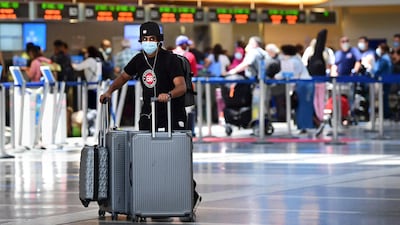Global airlines battered by the Covid-19 pandemic, the worst crisis to hit the aviation industry, are at a turning point, according to the outgoing chief economist of the world's biggest airline industry body.
But carriers must heed the harsh lessons learnt as they start to recover, Brian Pearce, the International Air Transport Association (Iata)'s top researcher, told The National ahead of his retirement next month.
Once governments roll back restrictions to air travel and as the vaccine distribution gains pace more widely, more people will fly and airlines will rely less on state aid, he said.
Large domestic travel markets – such as the US and China – are already recovering and expected to return to pre-crisis levels by the second half the year, he added.
"We see light at the end of the tunnel now, we can see the point in the future when international travel markets will be opened up as vaccinations roll out to a substantial number of the population," Mr Pearce said. "The game is changing now: it's moving away from governments keeping airlines on life support to thinking of a roadmap to getting back to air travel and an industry that can stand on its own feet."
International travel remains depressed, lagging behind domestic markets' recovery by a year or two, because of governments' risk-averse approach to reopening borders, the chief economist said. The uneven vaccination distribution in emerging markets is a concern, meaning mainly advanced economies will re-open to international travel faster, Mr Pearce said.
Iata expects the outlook for global airlines to brighten in the second half of the year. Total air passenger numbers in 2021 will be 52 per cent lower than they were in 2019, before bouncing back in 2022 to 88 per cent of their pre-crisis levels and exceeding pre-pandemic levels (105 per cent) in 2023.

There are lessons learnt from the pandemic that airlines must take into account to be better prepared for future shocks.
Carriers will need to hold more cash balances, have a more flexible cost base, reduce their high level of debt that has worsened during the pandemic to avoid collapsing or government take-over and become much better capitalised, Mr Pearce said.
The industry also needs more consolidation, with some operators failing and weaker ones taken over by more efficient competitors, he said.
"I worry that we have not really seen this process start, partly because governments have been so involved," the chief economist said. "I do worry that governments might get in the way of this necessary restructuring that needs to take place to end up with a healthier industry."
Since the pandemic started, governments around the world have provided $225 billion in aid to the aviation sector to support a travel recovery.
The main threats to the uneven recovery unfolding around the world are containing the new virus variants effectively through vaccinations or testing programmes and governments' reluctance to lift travel barriers, Mr Pearce said.
Other risks to the recovery are the high charges imposed by some in the aviation supply chain, who are trying to recoup their losses from the pandemic and the high costs of PCR testing that are doubling or quadrupling travel expenses and hurting bookings, he added.
While the pandemic has necessitated measures such as PCR testing during travel, the industry must take care that these protocols are not implemented for longer than needed, Mr Pearce said.
"The trouble is, some measures put in place in response to specific incidents aren’t removed and that adds to the hassle and uncertainty and restricts travel and pleasure of travel," he said.
Digital health certificates will be necessary to avoid long queues and chaos at airports once travel returns to normal levels as the paper-based systems will not have the capacity to deal with passenger flows, Mr Pearce said.
Mr Pearce, who has about two decades of aviation experience and has seen his share of industry shocks, reflected on the past crises that the global aviation industry has endured over the years.
With previous crises, such as the 2008 financial crisis or the 9/11 terror attacks, travel typically recovered quickly within six to 18 months.
The travel industry, however, is still grappling with the Covid-19 pandemic since it began to spread in January 2020.
"We are 16 months into the crisis and we're still two-thirds down than where we were pre-crisis so this one is much, much deeper and probably longer than what we've seen before," he said.
The chief economist has led Iata's data-based economic analysis and insights on aviation’s global performance.
The economic forecasts have helped to "develop a narrative and illuminate the state of travel" and the wider economy, he said. This has in turn helped make the case for governments to support airlines and provide guidance for the way forward.
Mr Pearce also said the next challenge for airlines is the transition to clean fuel but that governments must support technologies that are affordable. He is also optimistic on the industry’s efforts for a more gender-balanced workforce.


